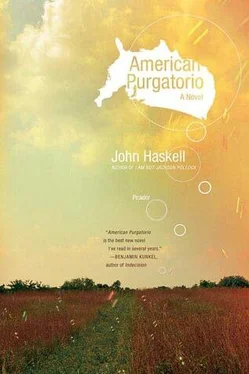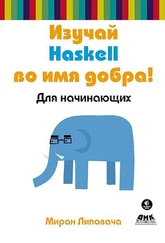John Haskell - American Purgatorio
Здесь есть возможность читать онлайн «John Haskell - American Purgatorio» весь текст электронной книги совершенно бесплатно (целиком полную версию без сокращений). В некоторых случаях можно слушать аудио, скачать через торрент в формате fb2 и присутствует краткое содержание. Год выпуска: 2006, Издательство: Picador, Жанр: Современная проза, на английском языке. Описание произведения, (предисловие) а так же отзывы посетителей доступны на портале библиотеки ЛибКат.
- Название:American Purgatorio
- Автор:
- Издательство:Picador
- Жанр:
- Год:2006
- ISBN:нет данных
- Рейтинг книги:3 / 5. Голосов: 1
-
Избранное:Добавить в избранное
- Отзывы:
-
Ваша оценка:
- 60
- 1
- 2
- 3
- 4
- 5
American Purgatorio: краткое содержание, описание и аннотация
Предлагаем к чтению аннотацию, описание, краткое содержание или предисловие (зависит от того, что написал сам автор книги «American Purgatorio»). Если вы не нашли необходимую информацию о книге — напишите в комментариях, мы постараемся отыскать её.
Los Angeles Times
American Purgatorio — читать онлайн бесплатно полную книгу (весь текст) целиком
Ниже представлен текст книги, разбитый по страницам. Система сохранения места последней прочитанной страницы, позволяет с удобством читать онлайн бесплатно книгу «American Purgatorio», без необходимости каждый раз заново искать на чём Вы остановились. Поставьте закладку, и сможете в любой момент перейти на страницу, на которой закончили чтение.
Интервал:
Закладка:
6
In the morning the ranger knocked on my window. He gave me a ride to the ranger station where I called the towing service. As I waited for the tow truck, I wandered around the exhibits and dioramas, reading about desert plants. As I sat on the toilet in the Park Service headquarters I realized I hadn’t thought about Anne for almost a day, and thinking that, I remembered how she used to arch her feet when she sat on the toilet.
When the tow truck came I watched the man hook the Pulsar to a chain and winch it onto the truckbed. I got in the cab and we drove off across the undulating flatness of the desert, punctuated here and there by masses of less eroded sandstone in the otherwise eroded expanse. There were ruins along the road but I wasn’t paying all that much attention. I was worried about the bill. The driver, the son of the tow truck owner, talked about timing belts and said there was a fifty-fifty chance of piston damage.
We pulled into the Sinagua Trading Post, a curio shop and towing service with a junkyard in the back. It was run by a man named Cecil, an old Arizona leatherneck — literally a man with a leatherlike neck — who told me my car was junk. He said he’d fix it if I wanted him to, but there was a fifty-fifty chance of valve damage. He said he’d buy the car and offered me fifty dollars, which just about covered the tow.
I wanted more than that. This was my life and I didn’t want to give it away, which is what the man, essentially, was asking. I was not in a good negotiating position, leverage-wise, but I didn’t want to let go. I’d bought the car and had invested the car with my dreams. Money too, but mainly dreams. I’d invested that small, powerless, uncomfortable car with my life, so it wasn’t that easy to just let go, to just say take it, to just walk away from what had been my self.
When we dream of cars and driving in cars, they say we’re dreaming, partly, about our selves, the things that move us through the world. And at first Cecil seemed to recognize this; he was polite and even compassionate, but he was also businesslike. He added up the hours replacing a timing belt, and parts. Plus the tow. Plus the fact that the car wasn’t worth that much from the get-go. And then he gave me time to think. Which I did, outside the store, on a bench in the shade, looking at the hills, watching cars pass on the road. Slowly I came to a realization that the era of the car — and me in the car — was over. My car was gone, and being gone it was one less thing to stuff my life with.
So I sold the car. In the process of selling it, what with papers of transfer and registration fees, I ended up having to pay Cecil (with my credit card) about fifty dollars, but it was worth it. I felt a lightness. I’d lost this thing which had meant so much to me and now, without it, I felt a weight had been lifted. Instead of feeling the loss I thought I would feel, I felt renewed.
I took the cactus out of the car, carried it to a suitable location in the desert sand, dug a shallow hole with my fingers, and planted it. I left the antique binoculars in the glove compartment, and I took out of the car my box of books and the envelope of photographs, including the one which had fallen off the dashboard. I took my laptop computer, the plastic sack of cassette tapes, the mandolin, a backpack filled with my clothes and sleeping bag, and a small red shoulder bag. I stood in the sun, in front of the building’s Fort Apache architectural façade, and once again I was waiting. This time for a ride into town where I would catch a bus, somewhere.
After a while of waiting, a man in a large mobile home who’d stopped at the trading post gave me a ride. He was a retiree who told me that “Anasazi” was no longer a correct term for the ancient people who lived there. He said that “Anasazi” meant “enemy” in Navajo, and that the Hopi, who also lived in the area, naturally thought the word was an incorrect description. People had lived with the word for a long time, but now, according to the man, quoting a Visitor Center brochure, they were changing it.
The man let me off at a main intersection in the northern part of Flagstaff, near the railroad depot. I was going to do what people do in the movies, take the first train out of town, but a railroad employee behind a booth told me no train was leaving anywhere until the next day, and since it was already getting into the afternoon, I started walking to one of the bars the man recommended, walking with my box of books in my arms, the backpack and haversack and mandolin on my shoulders, and the bag of cassettes in my fingers, until my fingers gave out, then stopping, setting down the load, resting, then walking some and then resting, then walking and resting, and I carried my possessions into an older, seedier quarter where I happened to see the El Rancho Grande, a bar I’d noticed the day before. It was an old bar, an old-style bar, almost empty, and I went to the bar and took the money I had left and had a beer. I was leaning against the bar in a typical way when an older woman who looked a little ragged took the stool next to me, said “Hi,” and then asked me to buy her a drink. Which I did. She introduced herself as Conchita, which was fine, but then from somewhere in the shadows of the bar another woman, a younger woman, joined me on the other side. This was Conchita’s niece, named Cheyenne, and she also wanted a drink.
I said I really didn’t have enough money, which was mostly true, but I also wanted to start on my new life and I wasn’t sure this was it. I wanted to be rid of unnecessary appurtenances, but money was not, at this point, unnecessary. I said I couldn’t buy them a drink but I offered to go in on a pitcher of beer, but by then they were already kneeling on the floor, examining the plastic bag filled with cassette tapes.
I offered them my books. I said, “Check out some of these,” but they were too busy checking out the tapes. I’d spent years recording the songs on those tapes but I was ready to let them go. My new friends weren’t impressed with my taste in music but they wanted the tapes, and were reaching into the plastic sack, indiscriminately taking every tape that touched their hands, not that they intended to listen to them, but because these things existed. I told them to take the whole bag, which they did, too far gone, or too lost in their own wanting, to notice when I left.
Although my load was somewhat lighter, I still had the other articles of my life, and I carried these up the street to a coffee shop. The train depot worker had mentioned a “hangout” place, and this was it. An imitation New York beatnik coffeehouse. I noted the college students sitting at various secondhand tables, and I was going to order something warm and comforting, but realized that I was extremely low on money. So I just sat at the wooden bar. Someone sat down next to me, a student probably, and this person started talking to me. She looked like a student and I talked to her, and oddly, I didn’t want to sleep with her, which would have also meant a place to stay. Instead, I asked her if she liked to read books.
She said she did and I showed her the ones in my box and she picked out a couple that interested her. I pointed out the mandolin case and she opened it, took out the instrument, and although she said she couldn’t play, she held it as if she was about to play. I told her it was my father’s mandolin and that I couldn’t play it.
“You can have it,” I said, but she said she didn’t need it. “I would like you to have it,” I said, and she took it and thanked me. She held it flat in her arms. I showed her the computer in my backpack. “Are you kidding?” she said. “It’s old,” I said, and I set it on top of the mandolin case. She stood there. “I don’t know,” she said, and I told her, “I’m not using it anymore.”
Читать дальшеИнтервал:
Закладка:
Похожие книги на «American Purgatorio»
Представляем Вашему вниманию похожие книги на «American Purgatorio» списком для выбора. Мы отобрали схожую по названию и смыслу литературу в надежде предоставить читателям больше вариантов отыскать новые, интересные, ещё непрочитанные произведения.
Обсуждение, отзывы о книге «American Purgatorio» и просто собственные мнения читателей. Оставьте ваши комментарии, напишите, что Вы думаете о произведении, его смысле или главных героях. Укажите что конкретно понравилось, а что нет, и почему Вы так считаете.











